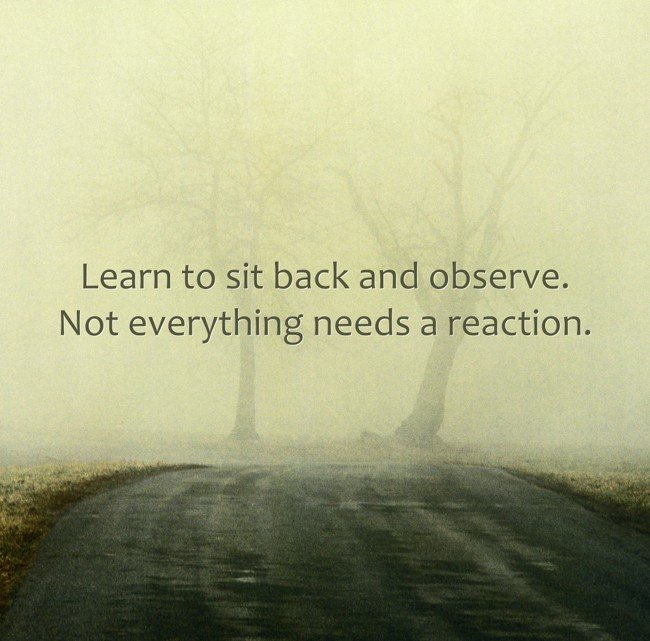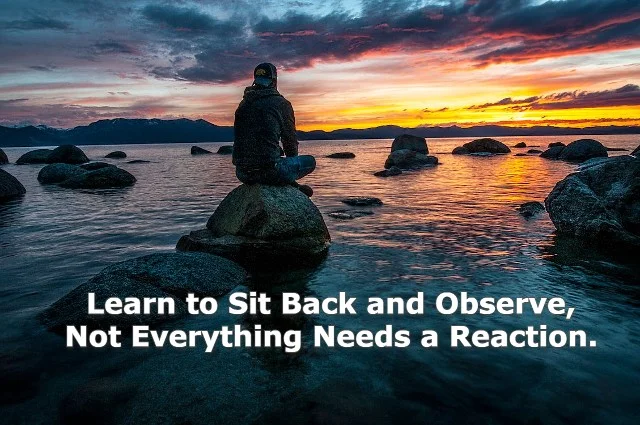In our fast-paced world, it’s easy to feel the need to react to everything that happens around us. However, one of the most powerful lessons we can learn is to learn to sit back and observe. Not everything needs an immediate reaction. This approach to life can bring about greater peace, understanding, and more meaningful connections with others. In this article, we’ll explore why it’s important to develop the ability to observe without reacting, how to practice this skill, and the benefits it can bring to your personal and professional life.
The Importance of Learning to Sit Back and Observe
Understanding the Power of Observation
When you learn to sit back and observe. not everything needs to elicit a reaction. Observation is a powerful tool that allows us to gather information, understand situations more clearly, and make better decisions. By observing, you give yourself the space to process what is happening, rather than jumping to conclusions or reacting impulsively.
Observation also helps you understand the motivations and emotions of others. By taking a step back and observing, you can gain insights into why people act the way they do. This understanding can lead to more empathetic and effective communication, as well as better problem-solving abilities.
Reducing Unnecessary Stress
One of the most significant benefits of learning to sit back and observe is the reduction of unnecessary stress. When you react to everything around you, it can lead to heightened emotions and stress. However, when you recognize that not everything needs a reaction, you can choose to focus your energy only on what truly matters. This mindset shift allows you to maintain a sense of calm and composure, even in challenging situations.
Moreover, by observing rather than reacting, you can avoid escalating conflicts or making hasty decisions that you might later regret. This approach promotes a more peaceful and mindful way of living, where you can navigate life with greater ease and clarity.
How to Practice Sitting Back and Observing

Cultivating Mindfulness
To learn to sit back and observe. not everything needs to be immediately addressed or resolved. Mindfulness is a practice that can help you develop this skill. By being mindful, you become more aware of your thoughts, feelings, and surroundings without becoming attached to them. This awareness allows you to observe without the need to react impulsively.
Start by incorporating mindfulness into your daily routine. This can be as simple as taking a few moments each day to sit quietly and focus on your breath. As you practice mindfulness, you’ll begin to notice your thoughts and reactions more clearly. This awareness is the first step in learning to observe without reacting.
Practicing Patience
Patience is another crucial aspect of learning to sit back and observe. Not everything needs to be rushed or resolved immediately. Sometimes, the best course of action is to wait and see how a situation unfolds. By practicing patience, you give yourself time to gather more information, consider different perspectives, and make more informed decisions.
To cultivate patience, try to slow down your response time in conversations and situations. Instead of reacting instantly, take a moment to pause and think before you speak or act. This practice not only helps you avoid unnecessary conflict but also allows you to respond in a more thoughtful and measured way.
The Benefits of Not Reacting to Everything
Improved Relationships
When you learn to sit back and observe. not everything needs to cause tension in your relationships. Reacting impulsively can lead to misunderstandings, arguments, and hurt feelings. However, by observing and taking the time to understand the other person’s perspective, you can communicate more effectively and build stronger, more harmonious relationships.
For example, in a disagreement with a friend or partner, rather than immediately defending your position, try sitting back and observing their point of view. This approach can lead to more constructive conversations and a deeper understanding of each other’s needs and emotions.
Better Decision-Making
Another significant benefit of observing rather than reacting is improved decision-making. Not everything needs to be decided on the spot. When you take the time to observe and gather information, you make decisions that are more informed and considered. This approach reduces the likelihood of making mistakes and increases the chances of achieving positive outcomes.
In professional settings, for example, leaders who practice observation tend to make better decisions that benefit their teams and organizations. By observing trends, behaviors, and feedback, they can make strategic choices that align with long-term goals rather than short-term reactions.
Applying Observation in Everyday Life
At Work
In the workplace, learning to sit back and observe can lead to better collaboration and productivity. Instead of reacting to every challenge or criticism, take the time to observe the situation. This can involve listening to colleagues’ viewpoints, analyzing data, and considering the long-term impact of your decisions.
By adopting this approach, you become a more effective leader or team member. Your ability to observe without reacting impulsively allows you to navigate workplace dynamics more smoothly and contribute to a positive and productive work environment.
In Personal Relationships
In personal relationships, not everything needs to be addressed immediately. Sometimes, it’s better to sit back and observe your partner’s or friend’s behavior before responding. This can prevent unnecessary arguments and help you understand their feelings and motivations better.
For instance, if your partner seems distant, instead of reacting with frustration or concern right away, try observing their behavior over time. This approach may reveal underlying stress or issues that can be addressed more calmly and effectively when the time is right.
Read more: Discovering the Impact of Newly Named Entities in Our World
Frequently Asked Questions (FAQ)
Learning to sit back and observe is important because it allows you to process situations more clearly and make better decisions. By not reacting impulsively, you can reduce stress, avoid conflicts, and improve your relationships and decision-making abilities.
To practice observing without reacting, try incorporating mindfulness and patience into your daily routine. Take moments to pause and reflect before responding to situations. This will help you develop the habit of observing without the need for immediate action.
The benefits of not reacting to everything include improved relationships, better decision-making, and reduced stress. By choosing when and how to respond, you can navigate life with greater calmness and clarity.
Yes, learning to sit back and observe can improve your work performance. By observing workplace dynamics and gathering information before making decisions, you can contribute to a more positive and productive work environment.
Patience is key to observing without reacting because it allows you to take the time to understand situations fully before responding. This leads to more thoughtful and measured actions, reducing the likelihood of conflict or mistakes.
Conclusion
To learn to sit back and observe, not everything needs an immediate reaction is a valuable skill that can transform your life. By cultivating observation, mindfulness, and patience, you can reduce stress, improve your relationships, and make better decisions. This approach allows you to navigate life with greater ease, focusing your energy on what truly matters while letting go of the need to control every situation.
Whether in your personal relationships or professional life, the ability to observe without reacting can lead to more meaningful connections, better outcomes, and a more peaceful existence. Start practicing this skill today and discover the profound impact it can have on your overall well-being and success.


